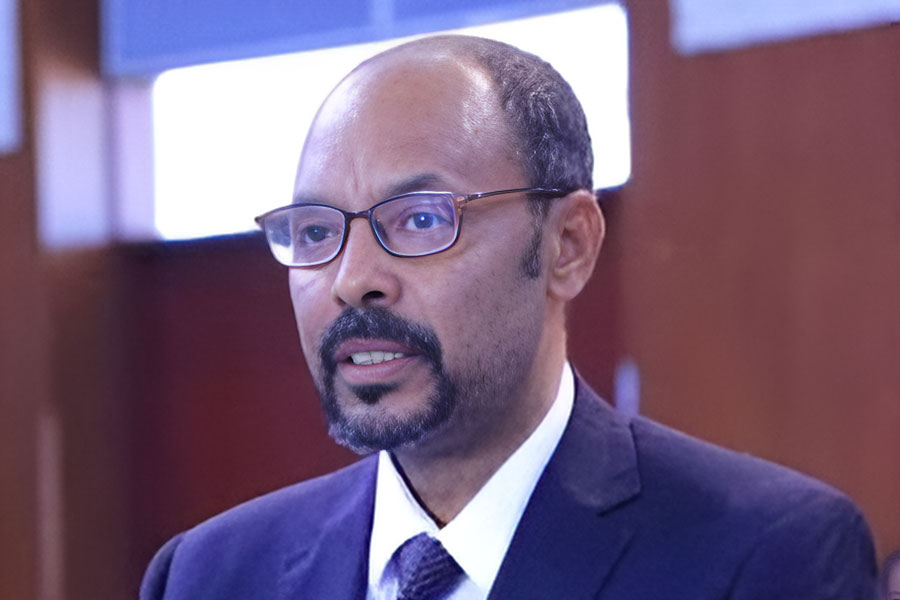
Radar | Oct 02,2021
Nov 14 , 2020
By Matewos Berhanu
Once again, the United States has emphasised its emblematic composure of inclusiveness regardless of origin, race or differences of ideas with the election of former Vice President Joe Biden to the presidency. The "stronger together" trumpet has been sounded much louder for diversity than homogeneity. It has set an exemplary position to all nations that human potential is best harnessed in togetherness, where unity in diversity is rewarded with political stability.
It can be reasonably argued that the US is a country that reflects best how the wide spectrum of races, ethnicities and, most of all, ideologies are bounded up by civilisation. With minority groups, from women to African Americans, inching ever closer to economic and political empowerment, it has reignited hope in the American project.
Putting aside the complexity of politics and partisanship, for what it is worth, the United States has reiterated its message of unity among human races that echoes across all corners of the globe. This is not to imply perfection or to overlook the extremes of the Left and the Right that has come to underlie the nation’s politics.
It does not take being an American citizen to realise that there are also many areas where the nation’s politics has become dysfunctional, especially the attitudes toward policies and decisions coming from the other side of the aisle. The kind of dissension exhibited at times by representatives on political issues compels the mind to doubt if the figureheads on both sides of the aisle are even contemporaries.
Indeed, the growing polarity among the American public, sourced from racial or ideological differences, also portends that there may be dark times yet to come. There is little to suggest the exceptional reality of this than the fact that President Donald Trump has still not conceded the election that was held earlier this month. Trusted elections and smooth transitions of power are shining expressions of civilisation and democracy.
Worth noting is what the past four years of the US presidency have left for the world. It is nothing short of astounding that a single four-year term of a US president has consequences on the rest of the world for years, if not decades, to come. These range from agreements on climate change and the Iran nuclear deal to international multilateral institutions and the Israel-Palestinian conflict.
This is not to mention the Ethio-Egyptian political impasse over the Grand Ethiopian Renaissance Dam (GERD) and the Trump administration’s involvement in it. From Trump’s off the cuff remarks to the evident lack of neutrality in the attempt to bring the two parties to a negotiation, it was a case of how a single administration’s policy objectives impact countries across the world.
This should be concerning for the global order, although it has been obvious for some time that power has been concentrated in the hands of very few countries for too long. It sends a serious message to the international community to strengthen multinational institutions and ensure a fairer distribution of power on decisions to be made about global issues.
Still, there are lessons for Ethiopia to derive, especially in the effort to forge unity and build strong institutions. That is not an oversight on the fact that Ethiopia has for generations been an icon of the diversity of cultures, languages and religions, though they have been leading to conflict and displacement for long.
An element of the political malaise is political leadership, the essence of which lies in acting for the good of the people within the context of plurality. The nation’s history of nation-building should not be a chronological naming of leaders but a representation of its rich and diverse social makeup. People should not be canvases on which leaders’ paint. They are themselves the masterpiece.
As much as we cherish and celebrate peace, which is a valuable treasure, we need to understand and commit ourselves to what it takes to establish and maintain it. If nothing else, America’s relative political stability is a good lesson in this.
PUBLISHED ON
Nov 14,2020 [ VOL
21 , NO
1072]


Radar | Oct 02,2021

Viewpoints | Jan 14,2023

Viewpoints | May 02,2024

Radar | May 18,2024

Verbatim | Apr 08,2023

Radar | Dec 10,2022

View From Arada | Nov 05,2022

Radar | Sep 14,2019

Radar | Sep 10,2021

Viewpoints | Feb 01,2020

My Opinion | 131770 Views | Aug 14,2021

My Opinion | 128154 Views | Aug 21,2021

My Opinion | 126099 Views | Sep 10,2021

My Opinion | 123721 Views | Aug 07,2021

Dec 22 , 2024 . By TIZITA SHEWAFERAW
Charged with transforming colossal state-owned enterprises into modern and competitiv...

Aug 18 , 2024 . By AKSAH ITALO
Although predictable Yonas Zerihun's job in the ride-hailing service is not immune to...

Jul 28 , 2024 . By TIZITA SHEWAFERAW
Unhabitual, perhaps too many, Samuel Gebreyohannes, 38, used to occasionally enjoy a couple of beers at breakfast. However, he recently swit...

Jul 13 , 2024 . By AKSAH ITALO
Investors who rely on tractors, trucks, and field vehicles for commuting, transporting commodities, and f...

Jul 5 , 2025
Six years ago, Ethiopia was the darling of international liberal commentators. A year...

Jun 28 , 2025
Meseret Damtie, the assertive auditor general, has never been shy about naming names...

Jun 21 , 2025
A well-worn adage says, “Budget is not destiny, but it is direction.” Examining t...

Jun 14 , 2025
Yet again, the Horn of Africa is bracing for trouble. A region already frayed by wars...

Jul 6 , 2025 . By BEZAWIT HULUAGER
The federal legislature gave Prime Minister Abiy Ahmed (PhD) what he wanted: a 1.9 tr...

Jul 6 , 2025 . By YITBAREK GETACHEW
In a city rising skyward at breakneck speed, a reckoning has arrived. Authorities in...

Jul 6 , 2025 . By NAHOM AYELE
A landmark directive from the Ministry of Finance signals a paradigm shift in the cou...

Jul 6 , 2025 . By NAHOM AYELE
Awash Bank has announced plans to establish a dedicated investment banking subsidiary...